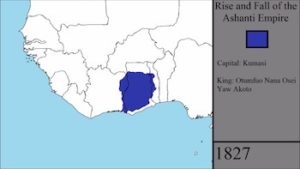
*The Ashanti Empire is celebrated on this date in 1690. This was an Akan empire and kingdom from 1701 to 1957.
It expanded from Ashanti to include the Brong-Ahafo Region, Central Region, Eastern Region, and Western Region of present-day Ghana, as well as some parts of Ivory Coast and Togo. Due to the empire's military prowess, wealth, architecture, sophisticated hierarchy, and culture, the Ashanti Empire has been extensively studied. It has more books written by European, primarily British authors than any other indigenous culture of Sub-Saharan Africa.
In the late 17th century, the Ashanti king Osei Tutu and his adviser Okomfo Anokye established the Ashanti Kingdom, with the Golden Stool of Asante as the sole unifying symbol. Osei Tutu oversaw a massive Ashanti territorial expansion, building up the army by introducing new organizations and turning a disciplined royal and paramilitary army into an effective fighting machine. Ashanti political organization was initially centered on clans headed by a paramount chief, Amanhene. One clan, the Oyoko, settled in Ashanti's sub-tropical forest region, establishing a center at Kumasi.
The Ashanti became tributaries of another Akan state, Denkyira. Still, in the mid-17th century, the Oyoko, under Chief Oti Akenten, started consolidating the Ashanti clans into a loose confederation against the Denkyira. The introduction of the Golden Stool was a means of centralization under Osei Tutu. According to legend, a meeting of all the clan heads of the Ashanti settlements was called just before declaring independence from Denkyira.

In this meeting, Okomfo Anokye, chief priest or sage advisor to Asantehene Osei Tutu I, commanded the Golden Stool down from the heavens and floated into Osei Tutu I's lap. Okomfo Anokye declared the stool symbolic of the new Asante Union (the Ashanti Kingdom). Allegiance was sworn to the stool, and Osei Tutu was the Asantehene. The newly declared Ashanti Union subsequently waged war against Denkyira and defeated it.
The stool remains sacred to the Ashanti as it is believed to contain the spirit or soul of the Ashanti people. In 1701, the Ashanti army conquered Denkyira, giving the Ashanti access to the Gulf of Guinea and the Atlantic Ocean coastal trade with white Europeans, notably the Dutch. The economy of the Ashanti Empire was mainly based on the trade of gold and slaves. The army served as an effective tool to procure captives. The Ashanti Empire fought several wars with neighboring kingdoms and lesser organized tribes such as the Fante.
The Ashanti defeated the British Empire's invasions in the first two of the four Anglo-Ashanti Wars, killing British army general Sir Charles MacCarthy and keeping his skull as a gold-rimmed drinking cup in 1824. British forces later burnt and sacked the Ashanti capital of Kumasi; however, after the final Ashanti defeat at the fifth Anglo-Ashanti War, the Ashanti empire became part of the Gold Coast colony on January 1, 1902. Today, the Ashanti Kingdom survives as a constitutionally protected, sub-national traditional state in the union with the Republic of Ghana. The current king of the Ashanti Kingdom is Otumfuo Osei Tutu II Asantehene. The Ashanti Kingdom is the home to Lake Bosumtwi, Ghana's only natural lake. The state's current economic revenue is mainly from trading in gold bars, cocoa, kola nuts, and agriculture.